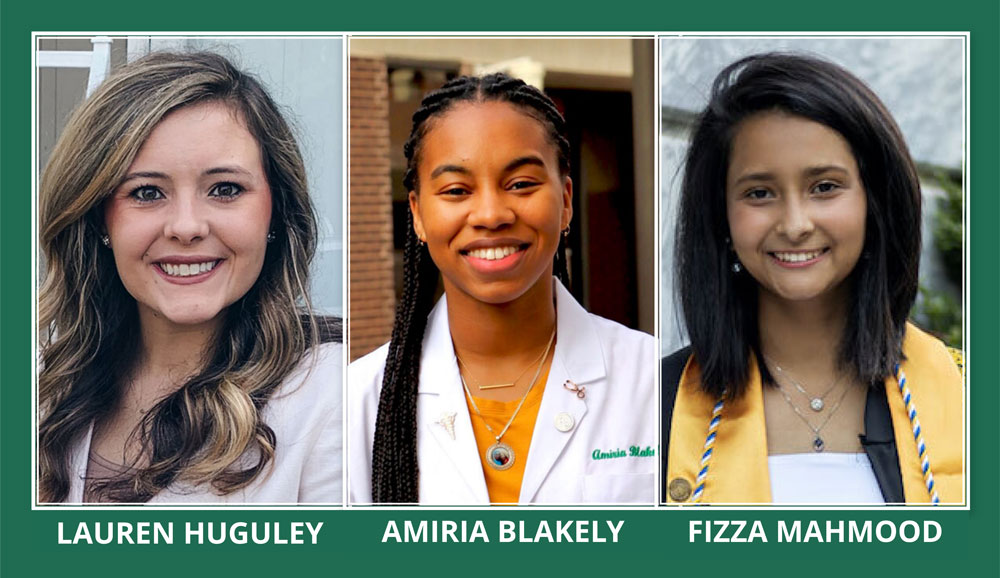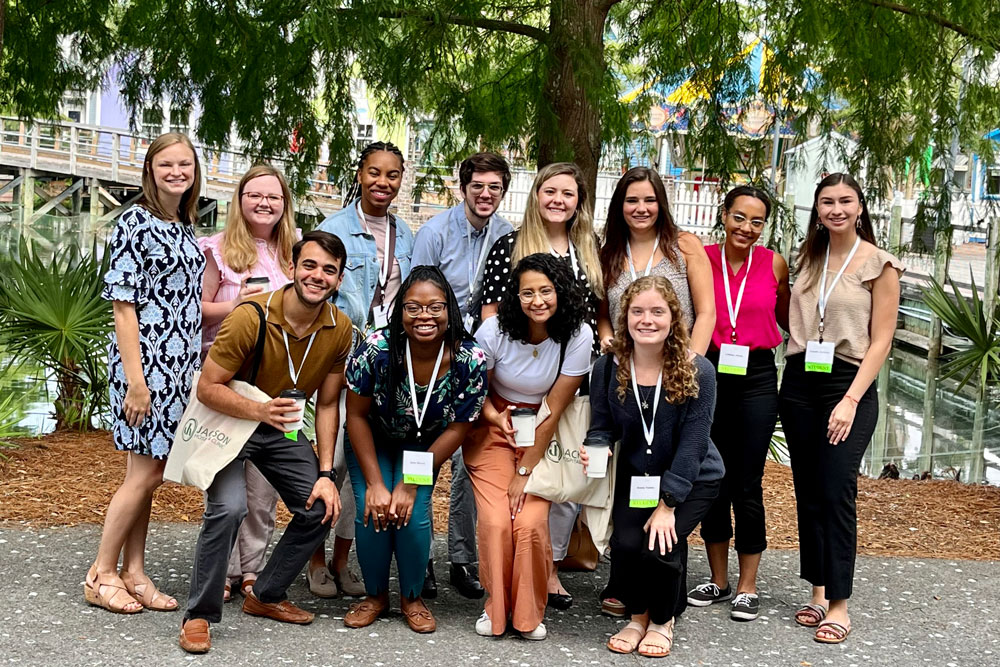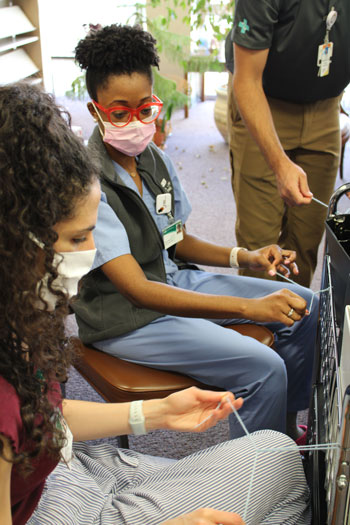 Over the past two years, the UAB Department of Family and Community Medicine has accepted over 20 medical students into the Comprehensive Urban Underserved and Rural Experience program (CU2RE). This program helps to prepare medical students interested in serving underserved areas as primary care doctors.
Over the past two years, the UAB Department of Family and Community Medicine has accepted over 20 medical students into the Comprehensive Urban Underserved and Rural Experience program (CU2RE). This program helps to prepare medical students interested in serving underserved areas as primary care doctors.
Three of the current, second-year medical students in the program, Fizza Mahmood, Amiria Blakely and Lauren Hughley, recently answered questions about their experience. Their answers paint a picture of what the program is like, and how it supports medical students.
Why did you apply to CU2RE?
Mahmood: “I was a political science and international studies major in undergrad, so I came into medical school looking for a way to keep educating myself on the interaction between politics and medicine. I remember looking through the list of modules and realizing how valuable it is to learn about these topics in a consistent manner while in med school, so I decided to apply!”
 CU2RE students at the American Academy of Family Physicians 2022 Conference.
CU2RE students at the American Academy of Family Physicians 2022 Conference.
(Editor’s note: The CU2RE modules for medical students include sessions on social determinants of health, cultural competency, telehealth, behavioral health, working in interprofessional teams and more.)
Blakely: “I applied to CU2RE because of my goal of becoming a primary care physician. CU2RE focuses on teaching students how to better serve underserved communities and gives them opportunities to learn from physicians in a primary care setting. I was immediately interested and knew CU2RE was the program for me.”
Hughley: “As soon as I heard about the CU2RE program as an MS1, I knew it was something I wanted to be involved with. I came into medical school with an interest in primary care and family medicine and was particularly interested in learning more about how primary care serves many of the underserved and unreached communities across the state of Alabama. I wanted to challenge myself to dig deeper and start asking more questions about some of the challenges that many residents of our communities are facing as they seek medical care. After learning about the CU2RE program and meeting some of the students, physicians, and faculty involved, I knew the program was going to be such a great opportunity for growth during my medical school training years.”
What have you learned in the program so far? Do you have any favorite experiences?
Mahmood: “I've learned a lot about the patient experience, and I've also become significantly more aware of the variety of resources available to patients and the different healthcare team roles.” Sharing a laugh at an end-of-the-year dinner for the first cohort.
Sharing a laugh at an end-of-the-year dinner for the first cohort.
Blakely: “I have learned so much about health equity, the history of medicine and prominent challenges that primary health care physicians face on a daily basis.”
Hughley: “There are so many things I have learned over this past year, but if I had to choose a favorite learning experience, it would be the time spent with my cohort this summer. We spent several days learning from different speakers on topics about health disparities, leadership, motivational interviewing, and more. We also spent a week focused on learning about the impact of racism in medicine and visited Montgomery to tour the Legacy Museum and the [National Memorial for Peace and Justice].”
(Editor’s note: Learn more about the CU2RE summer program, including the Montgomery trip, here.)
How has your experience in the CU2RE program affected how you think about primary care as a career?
Mahmood: “I honestly have learned a lot about what primary care really encompasses, and I've come to appreciate the mindset of primary care providers. Being a primary care provider (PCP) requires you to have a wide base of knowledge - from knowing how to treat depression to ankle sprains to infections. On top of that, you get to build longitudinal relationships with your patients, so it really feels like a specialty that can cater to everyone.” CU2RE students participate in a dermatology workshop.
CU2RE students participate in a dermatology workshop.
Blakley: “My experience in the CU2RE program has deepened my aspiration to become a PCP. It has shown me how much of a need there is for more PCPs in underserved communities. Although we still have a long way to go as a society when it comes to improving health outcomes for those in underserved communities, CU2RE shows how to work together and utilize our resources to work towards overcoming this challenge.”
Hughley: “My experience in the CU2RE program has furthered my interest in primary care and, specifically, Family Medicine. I am filled with so much hope and excitement as I see the physicians who are so passionate about the health and well-being of our state. I am eager to have the opportunity to develop relationships, advocate for change, and provide encouragement and support for my future patients.”
What would you say to a medical student who is thinking about joining the program?
Mahmood: “I would tell them that the CU2RE program will provide you with numerous opportunities to explore primary care fields and give you the tools necessary to think critically about how to meet the needs of your future patients. Alongside the mentorship and community you gain, CU2RE provides a place to discuss the strengths and pitfalls of our health care system and learn how we, as future physicians, can best impact outcomes for underserved populations."
Blakely: “I would tell them to do it because CU2RE has so much to offer. They will provide you with tools that all physicians could utilize. They will guide you on a journey to becoming a well-rounded physician. It will be an experience that you won’t regret.”
Hughley: “I would definitely encourage other students to consider applying for the CU2RE program. I have been stretched, challenged and changed over this past year in a way that is so rewarding and impactful. I know that I will be a better physician one day because of these experiences and I am so grateful to have such amazing mentors that believe in students and support our learning. CU2RE is such an amazing program and I would urge others to take advantage of this opportunity in their training.”
When asked about their favorite CU2RE experience, all of the students’ answers included their summer trip to Montgomery. In order to gain a better understanding of the effect of racism on the medical field, the group visited landmarks documenting the history of slavery, racism and racial terror in Alabama and nationwide, such as The National Memorial for Peace and Justice, the Legacy Museum and the Mothers of Gynecology Monument. The visits offered important perspective for medical students seeking to improve the medical field and provide health care to the underserved.
 CU2RE students before visiting the National Memorial for Peace and Justice in Montgomery.
CU2RE students before visiting the National Memorial for Peace and Justice in Montgomery.
“This experience gave me the opportunity to better understand myself and other women of color when it comes to how we view our health care,” Blakely said.
Mahmood also found value in the experience.
“Having discussions about the role of racism in medicine is crucial to understanding how we can be better advocates for our patients,” explained Mahmood.
Click here to take a deeper look at what these students learned and experienced during this trip.
Interested in being a part of the next CU2RE cohort? Applications open in Fall 2023 for first-year medical students. Aspiring medical students, however, can now apply for the CU2RE Longitudinal Primary Care Pipeline Program, which aims to prepare undergraduate and gap year students for medical school. To learn more or to apply, click here. Pipeline program applications close on January 15, 2023.